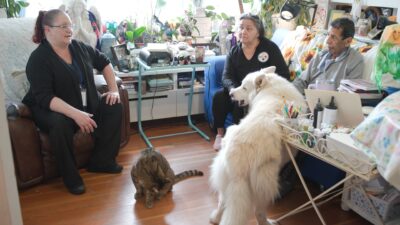With advance care planning, you can ensure that your end-of-life preferences for medical care are honored, even if you are unable to communicate them yourself.
Thinking about your wishes for end-of life care may not be easy, but it is important for you, your loved ones, and the healthcare professionals who care for you. Making your preferences known can remove uncertainty and give you and your loved ones peace of mind.
Make a plan
Advance care planning is a three-step process:
- Think carefully about the type of end-of-life care you want and the person you would like to carry out your wishes or make decisions for you.
- Discuss your preferences with those who are important to you and will honor your choices, including your healthcare providers.
- Document your wishes. Make sure your chosen decision-maker has a copy, as well as anyone else who may need it, including loved ones and your physician.
- Store the document — sometimes known as an advance directive or living will — where it is easy to find in an emergency; don’t lock it away. Consider keeping a copy in your car along with your vehicle registration.
- If the state where you live stores these documents electronically, consider taking advantage of this service.
Each step is important, but at a minimum, discuss your end-of-life preferences with your loved ones and healthcare professionals. Make your wishes known.
The vast majority of Americans would prefer to die at home rather than in a hospital or institutional setting, yet only about 30% do so. And 90% of people know they should discuss their end-of-life care preferences with loved ones, but only about 30% actually do. These tips may help you start the conversation about end-of-life care.
Advance directives
An advance directive is a legally binding document that states your wishes regarding health care. Also known as a living will, it is different from a last will and testament.
In addition to noting your preferences for end-of-life medical care, your advance directive may designate someone who can make medical decisions for you if you are unable to do so. This trusted person is sometimes known as a “healthcare proxy.”
No matter how you create your advance directive, the documents can be updated at any time and as often as you choose.
Advance directive documents can differ from state to state. Regardless of state requirements, all advance directives allow you, as a competent adult, to:
- Document your preferences for the health care you wish, or do not wish, to receive and specify at what point treatment should be discontinued. This includes decisions about life-sustaining treatments such as ventilators (breathing machines).
- Appoint a healthcare proxy — someone to make decisions on your behalf if you are unable to communicate your preferences on your own.
You can ask your physician or healthcare system to store your advance directive as part of your electronic health record. Some states allow residents to create or modify advance directives online; the state or a private company may store advance directive documents in an online registry.
Resources
The links below provide some helpful ways to begin the steps to advance care planning:
- The “Hello” Game
- The Conversation Project
- Five Wishes
- Go Wish
- Death Deck
- Prepare for Your Care
- Being Mortal documentary
Click here for a listing of impartial resources, such as state governments, bar associations, and universities. Most provide additional information, as well as access to their state-specific forms.



